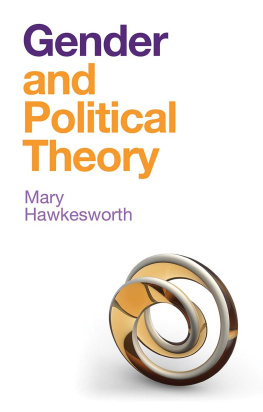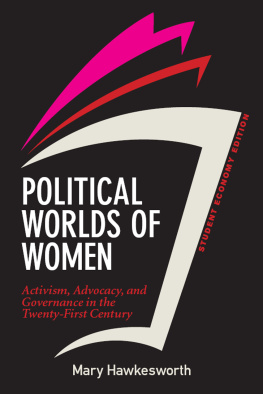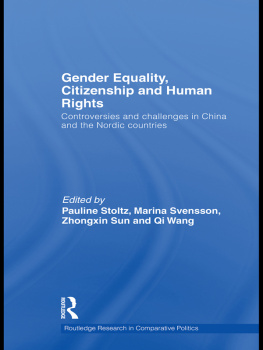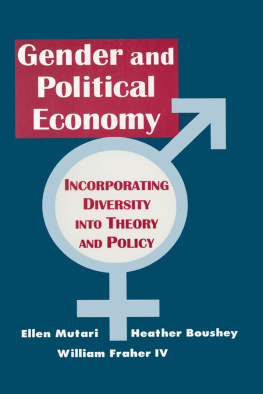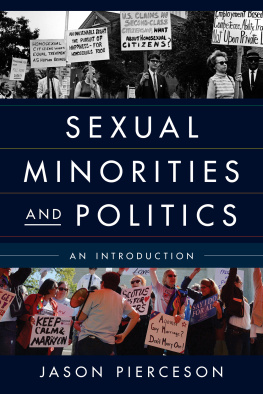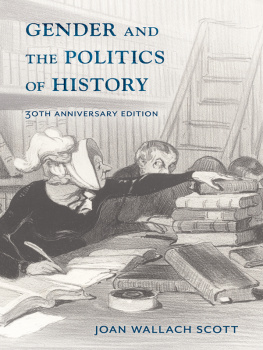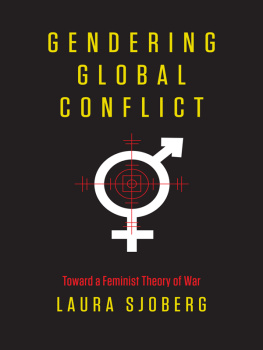
And Political Theory series
- Mary Hawkesworth Gender and Political Theory
Gender and Political Theory
Feminist Reckonings
Mary Hawkesworth
polity
Copyright Mary Hawkesworth 2019
The right of Mary Hawkesworth to be identified as Author of this Work has been asserted in accordance with the UK Copyright, Designs and Patents Act 1988.
First published in 2019 by Polity Press
Polity Press
65 Bridge Street
Cambridge CB2 1UR, UK
Polity Press
101 Station Landing
Suite 300
Medford, MA 02155, USA
All rights reserved. Except for the quotation of short passages for the purpose of criticism and review, no part of this publication may be reproduced, stored in a retrieval system or transmitted, in any form or by any means, electronic, mechanical, photocopying, recording or otherwise, without the prior permission of the publisher.
ISBN-13: 978-1-5095-2585-0
A catalogue record for this book is available from the British Library.
Library of Congress Cataloging-in-Publication Data
Names: Hawkesworth, M. E., 1952- author.
Title: Gender and political theory : feminist reckonings / Mary Hawkesworth.
Description: Cambridge, UK : Medford, MA, USA : Polity Press, 2019. | Series: And political theory | Includes bibliographical references and index.
Identifiers: LCCN 2018025183 (print) | LCCN 2018042205 (ebook) | ISBN 9781509525850 (Epub) | ISBN 9781509525812 | ISBN 9781509525829 (pb)
Subjects: LCSH: Sex role--Political aspects. | Political science--Philosophy. | Feminist theory--Political aspects.
Classification: LCC HQ1075 (ebook) | LCC HQ1075 .H396 2019 (print) | DDC 305.42--dc23
LC record available at https://lccn.loc.gov/2018025183
The publisher has used its best endeavours to ensure that the URLs for external websites referred to in this book are correct and active at the time of going to press. However, the publisher has no responsibility for the websites and can make no guarantee that a site will remain live or that the content is or will remain appropriate.
Every effort has been made to trace all copyright holders, but if any have been inadvertently overlooked the publisher will be pleased to include any necessary credits in any subsequent reprint or edition.
For further information on Polity, visit our website: politybooks.com
Sexed Bodies: Provocations
The referent, woman, has no prior unity, no bundle of easily recognized characteristics, traits, dispositions. (Hartman 1997: 99)
In August 1995, Kimberly Nixon responded to a recruitment ad placed by the Vancouver Rape Relief Society. A feminist nonprofit collective that provided a hotline, counseling services, and a small shelter for women who had suffered sexual violence, Vancouver Rape Relief was seeking volunteers to be trained as unpaid peer counselors. To qualify for the training, volunteers had to stipulate that they agreed with four core beliefs: (1) violence is never a womans fault; (2) women have the right to choose to have an abortion; (3) women have a right to choose who their sexual partners are; and (4) volunteers must work on an ongoing basis on their existing prejudices, including racism. Nixon shared these beliefs. In addition, she was a survivor of sexual assault as well as physical and emotional violence inflicted by her male partner. After receiving personal counseling from Battered Women Support Services in Vancouver, Nixon had volunteered both at Battered Women Support Services and at a halfway house for women in crisis. She wanted to help women who had experienced the trauma of sexual violence and she felt well qualified to undertake the training offered by Vancouver Rape Relief, so she applied for the program. Following a telephone interview and a face-to-face interview, she was invited to join the training program. During a break in the training session, however, Nixon was taken aside by the training facilitator Danielle Cormier, who asked if she had been a woman since birth. Nixon responded: Ive been who I am since I was born. I am a woman. I was just born wrong. She acknowledged that she had completed sex confirmation surgery in 1990. At that point, Cormier asked Nixon to leave, saying a woman had to be oppressed since birth to be a volunteer at Rape Relief. Because Nixon had lived as a man she could not participate men were not allowed in the training group (Wall 2007).
The day after her exclusion from the training, Nixon filed a complaint with the British Columbia (BC) Human Rights Tribunal, which had been created by the provincial government to resolve discrimination cases involving race, color, sex, sexual orientation, religion, disability, and age. Due to its backlog of cases, the Tribunal did not hold hearings on the complaint until December 2000. In the intervening years, Vancouver Rape Relief offered to make a formal apology to Nixon and pay $500 in compensation for hurt feelings. It also offered to allow Nixon to participate in the Societys work by joining the fundraising committee, but it refused to reconsider its decision to exclude her from the training program. Following hearings that lasted twenty-one days, and an additional eleven months of deliberations, the BC Human Rights Tribunal ruled that Vancouver Rape Relief had discriminated against Nixon and imposed a fine of $7,500the highest damage award in the Tribunals historyas compensation for the injury to Nixons self-respect and dignity. The Tribunal concluded that the actions of Rape Relief impacted on the dignity of Ms. Nixon and denied her the opportunity to participate fully and freely in the economic, social and cultural life of British Columbia (Vancouver Rape Relief v. Nixon et al., 2003 BCSC 1936 [150]; here and hereafter, numbers in square brackets refer to the paragraph in the court decision).
Vancouver Rape Relief appealed the Tribunal decision to the British Columbia Supreme Court, arguing that its action did not constitute discrimination for several reasons: the BC Human Rights Code did not include protections for gender identity, including transsexualism, hence the Tribunal had exceeded its jurisdiction; discrimination, according to the Code, occurred only in the context of employment or service provision and did not cover volunteer activities; Nixons exclusion was not discrimination because it was due to her lack of a bona fide qualification for the traininghaving the life experience of being raised as a woman; and finally, the BC Human Rights Code included a special exemption (Section 41) that allowed historically disadvantaged groups to organize among themselves to promote their interestsas a matter of freedom of association (Namaste and Sitara 2013: 21415).
In the first decade of the twenty-first century, Canadian courts were asked to resolve a host of complex questions about sex as a classificatory scheme, a legal status, a personal qualification, a subjective identification, and an object of knowledge. The ruling in Vancouver Rape Relief v. Nixon et al. (2003), crafted by the Honorable Mr. Justice E.R.A. Edwards, indicates the sweeping power of the state to regulate bodies and the questionable criteria it deploys to determine sex. Although Kimberly Nixon was anatomically female and held a birth certificate granted by the government of British Columbia indicating that she was legally female, the provincial Supreme Court ruled that anatomy and legal status were insufficient to establish her womanhood: The presence or absence of a birth certificate indicating Ms. Nixon is female cannot determine the outcome of this case [44].
Next page
